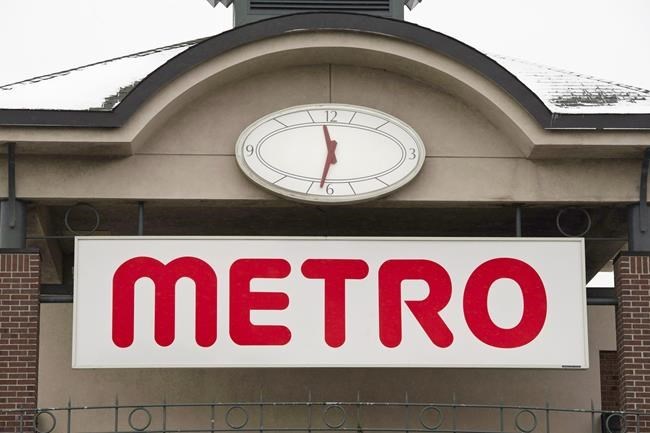MONTREAL — Against headwinds from a labour conflict and a mild cold and flu season, grocery and pharmacy retailer Metro Inc. posted higher first-quarter sales and profit on Tuesday compared with a year ago.
Although pandemic restrictions limited in-store foot traffic at the company's supermarkets, same-store food sales climbed 10 per cent as shoppers bought more groceries with each visit or online order, the company said.
But pharmacy same-store sales edged up only slightly, dragged down by a 3.8 per cent drop in front-store sales as COVID-19 measures reduced in-store traffic as well as demand for cough and cold products.
"When you have a cold or a flu you tend to go to the drugstore to pick up either a prescription and/or some (over-the-counter medicine) and while you're at it why buy not some gum," Metro president and CEO Eric La Fleche said during an investor call.
"When there are less people coming through the door, it has an impact on sales."
Metro also has about 650 drugstores primarily under the Jean Coutu, Brunet, Metro Pharmacy and Drug Basics banners.
The quarter was also impacted by a labour conflict at a Jean Coutu distribution centre in Quebec, which the company said had a dampening effect on overall sales.
"Our contingency plan enabled us to successfully maintain the supply of medication to over 400 pharmacies," La Fleche told investors. "We are now back to normal operating conditions in the distribution centre."
Meanwhile, Metro is expecting a new fresh food distribution centre in the Toronto area to open in the coming weeks.
La Fleche said construction is complete and it will start shipping produce to stores in the coming weeks, with the full rollout of the new distribution centre expected to take about three months.
"It’s a new state-of-the-art facility," he said, noting that it will be partially automated. "We will have better operating conditions and I think product quality will only improve."
Metro operates a network of roughly 950 food stores under several banners including the full-service supermarkets Metro and Metro Plus and the discount stores Super C in Quebec and Food Basics in Ontario.
Looking ahead, Metro's second quarter is set to be impacted by Quebec's COVID-19 measure banning the sale of non-essential goods in retail stores, which has left entire aisles of products under plastic wrap.
The provincial law is limiting the company's sales, said La Fleche.
"It affects general merchandise that we sell and mostly cosmetics, which is a significant part of our front end sales at Jean Coutu and Brunet," he said.
In the first four weeks of its second quarter, Metro said pharmacy front-end same store sales were down almost 12 per cent.
To mitigate the drop in sales, the company said its adjusting promotional activity and directing customers to shop online or to use the in-store order service.
In reporting its results, the grocery and pharmacy retailer raised its quarterly dividend to 25 cents per share, up from 22.5 cents.
Metro said it earned $191.2 million or 76 cents per diluted share for its first quarter, up from a profit of $170.2 million or 67 cents per diluted share in the same quarter a year earlier.
Sales for the 12-week period ended Dec. 19 totalled $4.28 billion, up from $4.03 billion a year earlier.
On an adjusted basis, Metro said it earned 79 cents per share for the quarter, up from an adjusted profit of 71 cents per share a year ago.
This report by The Canadian Press was first published Jan. 26, 2021.
Companies in this story: (TSX:MRU)
The Canadian Press



